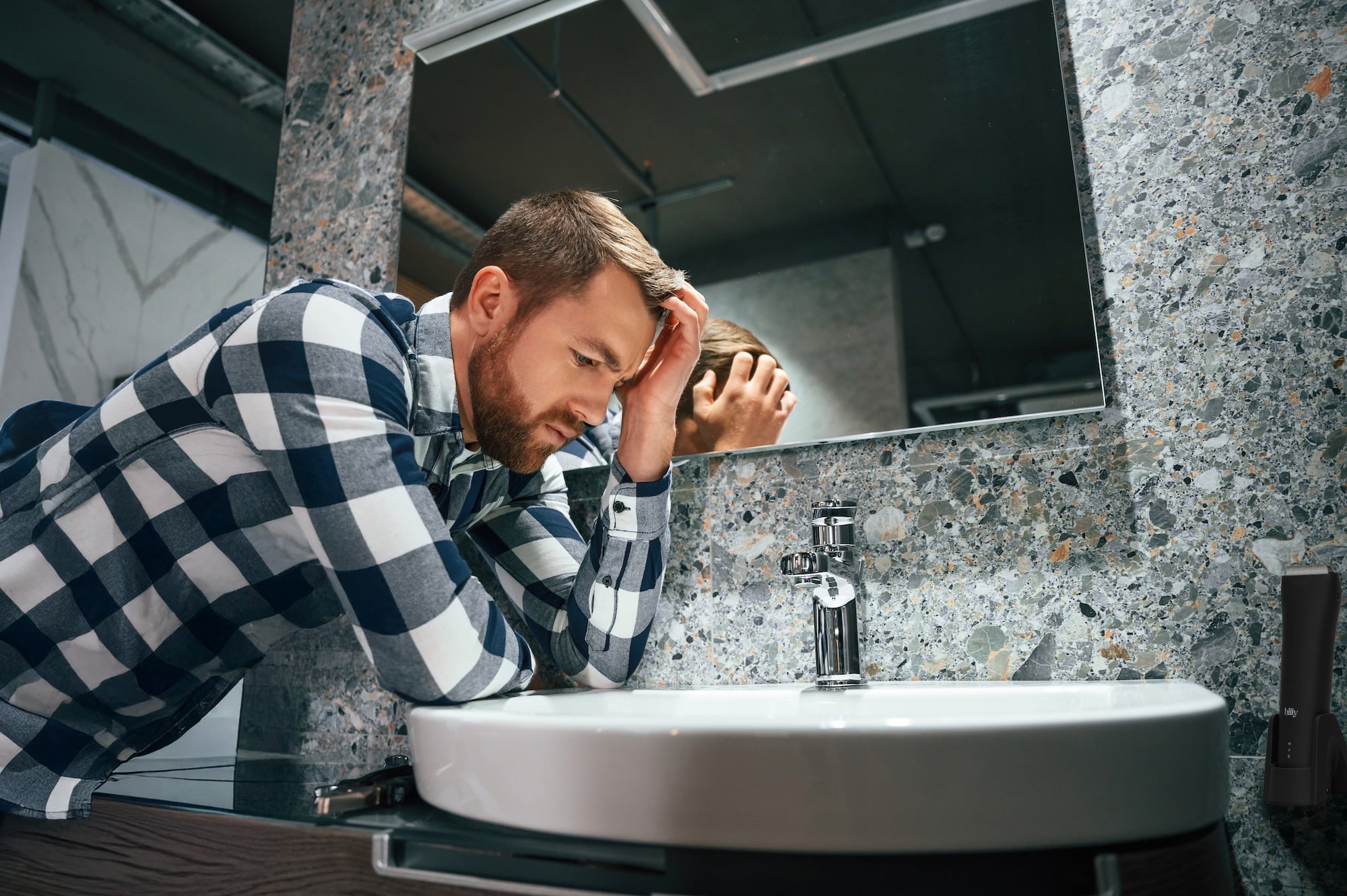Performance anxiety in bed is something we never really talk about with friends, is it? Yet, most men experience it at one time or another. That little voice in your head that whispers "what if it goes wrong?" right before an intimate moment... It's unfortunately more common than you might think.
In 2025, it's time to get to the bottom of this taboo subject and talk frankly about it. Because, between us, performance anxiety ruins all the fun, and we end up avoiding the moment altogether.
According to recent studies, more than a quarter of men aged 18 to 59 suffer from performance anxiety at some point. So no, you're definitely not alone.
What Exactly Is Performance Anxiety in Bed?
Imagine yourself in this situation: you're with someone you like, the atmosphere is perfect, but your brain starts working overtime. It starts calculating, analyzing, and predicting every possible disaster scenario. That's performance anxiety.
This anxiety turns what should be a natural and enjoyable moment into a real test. Your body tenses up, your mind races, and paradoxically, it's exactly this pressure that creates the problems we dread.
Performance anxiety is a complex vicious cycle. On one hand, you have your thoughts racing: "I have to be perfect," "She'll compare me to her exes," "What if my body doesn't keep up?" On the other, your body reacts to this stress by releasing hormones that will prevent exactly what you want to happen.
This anxiety can manifest itself in a variety of ways: difficulty achieving or maintaining an erection, premature or delayed ejaculation, decreased sensation, or simply an inability to be present and enjoy the moment. Sometimes, it can even lead to a complete aversion to sexual intercourse.
What makes this problem particularly vicious is that it's self-perpetuating. The more you stress about having a problem, the more likely you are to have one. And the more you have one, the more stressed you are about the next time. It's a bit like learning to ride a bike while being afraid of falling: you can't relax.
The Secret Worries Men Never Admit
Let's get straight to the point about what's really on our minds. Here are the thoughts most men keep to themselves, unfiltered:
"What if I can't get an erection?"
This fear is terrible because it creates exactly the problem we want to avoid. The more we think about it, the more stressed we become, and the more stressed we become, the more complicated it becomes. A real vicious circle.
But let's dig a little deeper. This anxiety often stems from a complete misunderstanding of how erections work. Many men believe that they should happen automatically, like a reflex, as soon as they are stimulated. In reality, erections are a complex phenomenon that involves the nervous, circulatory, hormonal, and psychological systems.
A "failed" erection can have a thousand causes: fatigue, stress, alcohol, medication, an uncomfortable position, distraction, or simply not being in the right frame of mind. It's completely normal and happens to all men, regardless of their age.
The problem is that our society has sold us the idea that a "real man" must always be ready. As a result, the first failure becomes a trauma that can ruin years of sex life. We begin to avoid certain situations, anticipate failure, and monitor our bodies instead of letting them do their thing.
"What if it ends too quickly?"
Premature ejaculation is a topic that makes many men sweat. We put pressure on ourselves to "last" a certain amount of time, without even knowing where these standards come from.
First, let's put things into perspective: what is "too fast"? Studies show that the average length of sexual intercourse (from penetration to ejaculation) is 5 to 7 minutes. Not the 2 hours and 30 minutes we see in movies... And most importantly, this length in no way determines the quality of the intercourse or the pleasure felt.
Premature ejaculation can be present since the first intercourse or appear after a period of "normal intercourse." It can be linked to psychological factors (stress, anxiety, depression), relational factors (couple problems, lack of communication), or sometimes physical factors (hypersensitivity, inflammation, hormonal problems). It can therefore be temporary and disappear as quickly as it arrived if you feel better.
Then, what often makes the problem worse is the spiral of anxious anticipation. The more you fear ejaculating too quickly, the more you'll focus on that fear instead of focusing on your sensations. And paradoxically, this focus on control can speed up the process or stop it altogether, which won't help you much.
There are effective techniques that can help: breathing exercises, stop-and-go techniques, Kegel exercises to strengthen the pelvic floor, or simply learning to better understand your body and its arousal signals.

"What if I don't last long enough?"
Conversely, some people put pressure on themselves to become love marathon runners. Spoiler: this is neither necessary nor necessarily enjoyable for the other person.
This obsession with duration stems largely from pornography, which paints a completely distorted picture of sexuality. In these films, sex lasts for hours, men are tireless machines, and physical performance takes precedence over everything else. As a result, many men develop completely unjustified hang-ups about duration.
In fact, numerous studies show that most women prefer "normal" intercourse (between 3 and 13 minutes, depending on the study) rather than exhausting marathons. Beyond a certain time, natural lubrication diminishes, sensations fade, and discomfort can even appear.
What really matters is the quality of the connection, the focus on mutual pleasure, and the communication between partners. A 5-minute encounter with attentive foreplay and genuine complicity will always be more satisfying than a mechanical, disconnected 45-minute performance.
But once again, here as for the rest, everyone has their preferences and the best attitude would be to get to know each other and communicate around the subject to remove preconceptions and not try to achieve objectives that the other does not even expect.
If you really feel like you're finishing too quickly, there are solutions: relaxation techniques, control exercises, communication with your partner to adjust the pace, or consulting a specialist if necessary.
"Am I physically well enough?"
Height, appearance, physical shape... These insecurities about our bodies can completely disrupt intimacy. And yet, most of the time, our partner couldn't care less about these "flaws" we invent.
The penis size complex is probably one of the most widespread and destructive. Studies show that 85% of women are satisfied with their partner's penis size, compared to only 55% of men who are satisfied with their own. This difference in perception speaks volumes about our male obsessions.
The anatomical reality is that the most sensitive area of the vagina is located in the first few centimeters. Beyond that, the nerve endings become scarce. In other words, having an "average" penis (between 12 and 15 cm when erect) is more than enough to provide pleasure.
But physical insecurities don't stop there. Many men put pressure on their overall appearance: stomach, muscles, body hair, scars, skin texture... Everything becomes a pretext for self-criticism and comparison.
This obsession with physical appearance can create avoidance behaviors: avoiding certain positions, keeping your t-shirt on, turning off the light, limiting foreplay to reduce "exposure"... These are all strategies that can decrease pleasure and intimacy while increasing stress. The best thing to do is to accept and love yourself as you are. In any case, you can't please everyone and you won't change anything, so it's best not to worry about it.
The Intimate Interview: When Hair Becomes a Source of Anxiety
Let's talk about a topic we often avoid: the impact of pubic hair maintenance on self-confidence. In 2025, the issue of intimate hair has become a real headache for many men.
On one side, there's the social pressure to go completely hairless, influenced by the codes of pornography and social media. On the other, there are those who advocate a return to natural hair. Between the two, many men find themselves lost, no longer knowing what to do with their body hair.
This uncertainty can become an additional source of anxiety before sex. "Is it too much? Not enough? Will it bother her/him?", what impact will my body hair have on oral sex ... These questions cloud the mind and add an unnecessary layer of stress.
However, there is a happy medium: maintenance rather than removal. Having well-groomed pubic hair, neither too long nor completely shaved, can actually boost self-confidence. It's like having a well-trimmed beard: it gives an impression of care and attention to oneself and remains pleasant to the eye and to use 😜
Regular grooming has several psychological benefits: it gives a sense of control over one's appearance and therefore improves self-confidence (like when you leave the hairdresser), improves hygiene and freshness, and can even increase tactile sensations. Above all, it makes you feel "prepared" and that helps a lot (it's like arriving at a sports competition with or without training...).
The important thing is to choose your style according to your personal preferences, not according to external dictates. Whether you prefer to keep your hair natural, trim it short, or shave it completely, the important thing is that you feel good in your body and in your head and everything else will follow naturally 🤩.
"Do I know what I'm doing?"
Inexperience is anxiety-inducing. We're afraid of coming across as an amateur, of not being up to the task, of disappointing. This pressure to perform is often completely out of touch with reality.
This anxiety is particularly strong among young men, but it can persist well beyond the first encounter. Even with experience, each new partner can reawaken these fears. Every body is different, every person has their own preferences, and what worked for someone else doesn't necessarily work.
The problem is that we're led to believe there's a "universal technique" for sexuality, as if there were a single set of instructions. In reality, sexuality is above all a question of communication, listening, and mutual adaptation.
This fear of inexperience can push some men to "overcompensate": multiplying the techniques seen in films, trying to impress with acrobatic performances, or on the contrary completely blocking themselves for fear of doing badly.
The truth is, most partners prefer someone who's attentive and a good listener, even if they're inexperienced, rather than a self-centered "expert." Humility and curiosity are often sexier than pretentiousness.
"What if I don't give enough pleasure?"
Wanting to please is wonderful. But when it becomes an obsession, it turns the act of love into an impossible mission. We put so much pressure on ourselves that we forget to enjoy it.
This preoccupation, while admirable in intention, can become counterproductive. When we focus solely on the other person's pleasure, we create enormous pressure that can inhibit our own ability to give pleasure.
Many men develop a true "altruistic performance anxiety": they become so focused on satisfying their partner that they forget about their own feelings. As a result, they become mechanical, lose their spontaneity, and end up giving less pleasure than they would like.
This obsession can also create pressure on the partner. Feeling that the other person is constantly monitoring their reactions, checking if they are doing the right thing, can become overwhelming and inhibit spontaneity on both sides.
The paradox is that to give pleasure well, you must also receive it. Excitement and pleasure are contagious. A partner who enjoys it without feeling guilty will naturally give more pleasure in return.
Where Does This Performance Anxiety Come From? The Real Roots of the Problem
This anxiety doesn't just happen. It often has deep roots that need to be understood in order to better treat them:
Daily Stress: When Life Interferes with Intimacy
Work, bills, family, projects... When your head is already full to bursting, it's hard to clear it for an intimate moment. General stress infects everything, including the bedroom.
Chronic stress acts like a real poison for sexuality. It increases the production of cortisol, a hormone that decreases libido and can cause erectile dysfunction. Stress also affects sleep quality, overall mood, and the ability to be present in the moment.
Today, our lives are more stressful than ever. Between professional pressures, financial worries, family and social obligations, many men live in a state of constant tension. Under these conditions, it's difficult to "switch" to a relaxing and enjoyable mode.
This stress can also create vicious cycles. A stressed man may experience sexual difficulties, which creates additional stress, which worsens sexual problems, and so on. Not to mention that sexual problems themselves can become a source of stress in the relationship.
The solution often involves a comprehensive approach: learning to manage general stress, creating moments of disconnection, practicing relaxing activities, and above all, not considering sexuality as an additional performance to be achieved.
Bad Past Experiences: When the Past Haunts the Present
An occasional breakdown happens to everyone. But if we start dwelling on it, this isolated experience can become the source of all our future anxieties.
These "sexual traumas" can take different forms: a failed first time, a hurtful remark from a partner, a period of stress that affected sexuality, or simply a series of disappointing relationships that created a feeling of failure.
The human brain tends to retain negative experiences more strongly than positive ones. It's a survival mechanism, but it can become debilitating in sexual life. A single negative experience can erase the memory of dozens of positive ones.
These bad experiences create what are called "self-fulfilling prophecies." We expect things to go wrong so much that we unconsciously set the conditions for them to actually go wrong.
It's important to understand that these negative experiences don't define your sexual abilities. They're often linked to specific circumstances that won't necessarily recur. Sometimes it can be helpful to sort out what was truly dysfunctional and what was just a poor fit between two people.
Lack of Self-Confidence: The Basis of Everything
If you don't truly love yourself, how can you be relaxed with someone else? Self-esteem is the foundation of everything. And that also includes feeling good about your body .
Sexual self-confidence is closely linked to overall self-esteem. A man who feels insecure in other areas of his life will tend to carry these insecurities over into his sex life.
This low self-esteem can have many origins: repressive upbringing, teasing during childhood or adolescence, constant comparisons with others, excessive perfectionism, or simply a natural tendency towards self-criticism.
In sexuality, this low self-esteem manifests itself through hypersensitivity to the judgment (real or imaginary) of the partner, a tendency to interpret the reactions of the other negatively, and an excessive focus on one's own "faults".
The good news is that self-confidence can be worked on. This involves better self-knowledge, acceptance of one's imperfections, appreciation of one's strengths, and sometimes therapeutic work to understand the origins of these insecurities.
Relationship Problems: When the Couple is on the Rocks
Unresolved tensions, arguments, lack of communication... If things are going badly in a relationship, it's bound to be felt in bed. Emotional and physical intimacy are linked.
The quality of a relationship directly affects the quality of sexuality. It's difficult to be vulnerable and abandoned with someone with whom you have unspoken feelings, resentments, or communication problems.
These relationship problems can create different types of sexual anxiety: fear of disappointing a partner with whom you walk on eggshells, difficulty communicating your needs and desires, feeling like you have to "compensate" by performing relationship problems, or simply loss of attraction related to conflicts.
Sometimes sexual problems are a symptom of deeper relationship issues. In other cases, they're the cause. In either case, it's difficult to address one without addressing the other.
Communication is key. It's important to be able to talk openly about your needs, fears, and expectations, both sexually and in your relationships. Sometimes, couples therapy can help resolve complex situations.
Mood Disorders: When the Mind Affects the Body
Generalized anxiety, depression... These mental health issues have a direct impact on sexuality. It's normal, and it's treatable.
Depression can drastically decrease libido, affect the ability to experience pleasure (anhedonia), and create a general fatigue that makes it difficult to engage in intimacy. It can also generate negative thoughts that interfere with intimate moments.
Generalized anxiety, on the other hand, can make it impossible to achieve the relaxation necessary for a fulfilling sex life. The mind remains on constant alert, unable to let go. Anxiety can also focus specifically on sexual performance.
These disorders can be aggravated by their treatments. Many antidepressants, for example, have side effects on libido and erectile function. This can create a vicious cycle: depression is treated, but sexual problems develop, which... depress.
It's important to discuss these side effects with your doctor. Solutions include adjusting dosages, changing treatment, adding other medications to counteract side effects, or using complementary therapeutic approaches.
How Anxiety Affects the Body: The Physiological Mechanism
When we're stressed, our body activates its "survival" mode. Perfect for escaping danger, not good for intimate moments. The body secretes cortisol (the stress hormone), lowers testosterone, and reduces blood flow to the penis.
To understand how anxiety affects sexuality, we need to understand what happens in our bodies when we're stressed. The sympathetic nervous system activates, releasing adrenaline and cortisol. These hormones prepare the body for action: the heart rate increases, breathing becomes faster, and muscles tense.
Problem: To function sexually, the body needs the opposite effect. The parasympathetic nervous system needs to take over, the body needs to relax, and blood flow needs to be directed to the genitals rather than the escape muscles.
This battle between the two nervous systems explains why it's so difficult to "force" an erection or orgasm. The more you force it, the more you activate the sympathetic nervous system, and the less effective it is.
Cortisol, the chronic stress hormone, has a particularly harmful effect. It decreases testosterone production, affects blood circulation, and can even alter the sensitivity of nerve receptors. The result: decreased libido, erectile dysfunction, and diminished sensation.
This physiological understanding is important because it helps to defuse the situation. A man who understands that his difficulties are linked to normal biological mechanisms will be less likely to interpret them as a personal failure.

How to Break Out of this Vicious Circle: Concrete Solutions
Good news: performance anxiety can be addressed. Here's how to regain control, with detailed and effective strategies:
Really Talking About It: Communication as the First Remedy
The hardest, but the most effective. Telling your partner, "I sometimes have trouble relaxing," can completely change the situation. An understanding partner already takes 80% of the pressure off.
This communication can take different forms depending on your level of intimacy and your personality. You can start with lighthearted hints: "Sometimes I get a little stressed before we get together" or "I need a few minutes to relax."
If you're in a stable relationship, a deeper conversation can be liberating. Explain your fears, your needs, your preferences. Many men discover that their partner has experienced the same anxieties as them.
This communication shouldn't be a monologue about your problems. Also, ask questions like, "What makes you happy?", "How do you prefer us to spend our time?", "What helps you relax?"
Talking can also mean establishing temporary "rules" that take the pressure off. For example, agreeing to have intimate sessions without penetration, just for the pleasure of getting to know each other without any performance goals.
Learning to Breathe: Practical Relaxation Techniques
Breathing techniques, meditation, mindfulness... Taking a few minutes to center yourself before intimacy can work wonders. Breathe deeply, relax your muscles, reconnect with your sensations.
Deep breathing activates the parasympathetic nervous system, which promotes relaxation and sexual arousal. The simplest technique: inhale for 4 counts, hold for 4 counts, exhale for 6 counts. Repeat 5-10 times.
Progressive muscle relaxation involves tensing and then releasing each muscle group, starting with the feet and working up to the head. This technique helps you become aware of tension and consciously release it.
Mindfulness meditation can be practiced during intimacy itself. Instead of thinking about your performance, focus on your present sensations: the temperature of your skin, the texture of your caresses, the smells, the sounds. This focus on the present moment prevents the mind from drifting into anxious scenarios.
Some people find it helpful to practice these techniques regularly, not just before intimacy. A daily practice of 10-15 minutes can reduce overall anxiety and improve the ability to relax during intimacy.
Stop Comparing Yourself: Deconstructing the Myths
Adult movies, friends' stories, social media... It's all showmanship or exaggeration. Your sexuality is yours. No one should judge or rate it.
Pornography has created completely unrealistic standards. Oversized penises, permanent erections, endless sex, women who constantly climax... None of this corresponds to the reality of ordinary sexuality.
We should also be wary of the "testimonials" we hear. People tend to exaggerate their sexual prowess, just as they exaggerate their salaries or athletic achievements. These embellished stories create impossible standards.
Social media doesn't help matters with its images of "perfect" bodies and couples who display a superficial closeness. Remember that these images are selected, retouched, and staged. They don't reflect everyday reality.
To break out of this comparative spiral, it may be helpful to limit your exposure to this content, at least temporarily. Replace pornography consumption with educational sexual information. Read honest accounts rather than fantasy stories.
Prioritizing Connection Over Performance: Redefining Sexuality
Instead of aiming for technical perfection, focus on shared pleasure. Caresses, kisses, glances... Intimacy is much more than simple penetration.
This approach often requires completely redefining what we mean by "successful sex." Instead of focusing on erection, penetration, and orgasm, broaden your definition of sexuality.
Take the time for foreplay, without seeing it as a simple warm-up before "the real thing." Massages, caresses, prolonged kisses, mutual exploration... These moments can be as intense and satisfying as penetration itself.
Develop your sensuality. Use all your senses: really look at yourself, touch yourself attentively, listen to your breaths and whispers, smell your natural scents. This sensory approach helps you stay in the present moment.
Communicate during the act. Say what pleases you, ask what pleases the other person. This real-time communication creates a bond that can be more exciting than pure performance.
Breaking Out of the Routine: Renewing Without Pressure
Sometimes changing your routine can help reduce the pressure. New positions, more foreplay, different locations... The important thing is to enjoy yourself without pressure.
Routine can become anxiety-inducing because it creates specific expectations. If you always have sex the same way, at the same time, with the same gestures, your brain will anticipate and potentially stress over each step.
Changing the location can be refreshing: living room, bathroom, or even outdoors if possible. Changing the time too: why always in the evening? Morning can be a different time of relaxation and energy.
Explore new ways to pleasure each other. Toys, massage oils, light role-playing... The idea isn't to revolutionize your sexuality overnight, but to introduce enough novelty to break anxious reflexes.
Sometimes it can be liberating to agree to sessions without penetration, just to explore and enjoy other pleasures. This temporary "ban" removes the pressure to perform and allows you to rediscover other forms of pleasure.
Taking Care of Your Body: The Global Impact of Well-being
Regular exercise, a balanced diet, and enough sleep... A fit body means a more peaceful mind. And taking care of your intimate areas can also boost your self-confidence.
Regular exercise improves blood circulation, increases testosterone production, and releases endorphins that reduce stress and anxiety. You don't need to be a bodybuilder: 30 minutes of brisk walking, swimming, or cycling a few times a week can already make a significant difference.
Diet also plays a role. Certain foods promote circulation and hormone production: fatty fish rich in omega-3s, antioxidant fruits and vegetables, nuts and seeds. Conversely, excess alcohol, tobacco, and processed foods can affect libido and performance.
Sleep is crucial. Lack of sleep lowers testosterone, increases cortisol, and reduces the ability to manage stress. Aim for 7-8 hours of quality sleep, with a regular schedule.
Personal hygiene also contributes to self-confidence. Feeling clean and well-groomed helps you relax in private. This includes general hygiene but also the care of intimate areas, which can really boost self-confidence and reduce some sources of anxiety.
Consult if Necessary: Knowing How to Ask for Help
Therapist, sexologist, doctor... If anxiety persists, don't hesitate to ask for help. It's not a failure, it's courage.
A general practitioner can first rule out physical causes: circulatory problems, hormonal imbalances, medication side effects. They can also prescribe additional tests if necessary.
A sex therapist specializes in sexual disorders. They can offer specific behavioral techniques, exercises to practice alone or as a couple, and help you understand the mechanisms of your anxiety.
A psychologist or psychiatrist may be helpful if performance anxiety is part of a broader anxiety disorder or is related to past trauma. Cognitive behavioral therapy (CBT) has been shown to be particularly effective for this type of problem.
In some cases, temporary medication may be considered, such as anti-anxiety medications to reduce general anxiety or specific treatments for erectile dysfunction. These treatments should always be prescribed and monitored by a doctor.
The Myths That Make Everything Worse: A Proper Disassembly
Certain misconceptions amplify performance anxiety. Let's set the record straight with some facts:
Myth: A man should always be prepared. Reality: Everyone has ups and downs; it's human. Libido fluctuates depending on stress, fatigue, mood, and health. Even the most "high-performing" men have periods of decline. This is normal and temporary.
Myth: Longer is better. Reality: Quality trumps quantity, always. Studies show that the ideal length for intercourse (according to the women surveyed) is between 7 and 13 minutes. Any longer than that can even cause discomfort.
Myth: Size is what matters. Reality: Most partners prioritize closeness and attention. The most sensitive areas of the vagina are in the first few inches. Technique, listening, and emotional connection matter far more than inches.
Myth: Talking about problems kills the mood. Reality: Communication strengthens intimacy and reduces tension. Couples who communicate openly about their sexuality have happier intimacy and longer-lasting relationships.
Myth: You have to come at the same time. Reality: Simultaneous orgasm is rare and unnecessary. Each person can enjoy pleasure at their own pace, and watching the other person come can be just as exciting as coming yourself.
Myth: Foreplay is just a warm-up. Reality: Foreplay can be the main course. For many people, it's even more satisfying than penetration. There's no hierarchy in sexual practices.
Special Intimacy and Anti-Anxiety Techniques
Here are some concrete methods developed by sexologists to reduce performance anxiety:
The "Sensory Focus" Technique
Developed by Masters and Johnson, this technique involves focusing solely on the physical sensations present, without any performance goals. For 15-20 minutes, explore each other without seeking genital arousal. The goal is to rediscover the pleasure of touch without pressure.
The "Stop-and-Go" Method
This technique helps reduce anxiety related to premature ejaculation. When you feel arousal rising, stop, breathe, let it subside, and then continue. This method teaches you to better understand your arousal signals and how to control them.
The "Body Presence" Exercise
Before intimacy, take 5 minutes to mentally scan your body. Start at your feet and slowly work your way up, noting sensations, tension, and relaxed areas. This technique grounds the body and reduces anxious mental activity.
The "4-7-8" Breath
Quick relaxation technique: Inhale for 4 counts, hold for 7 counts, exhale for 8 counts. Repeat 3-4 times. This breathing activates the parasympathetic nervous system and induces a state of calm conducive to intimacy.
The FAQ: Performance Anxiety in Bed
Is performance anxiety really common?
Absolutely. Studies show that up to 25% of men aged 18-59 suffer from performance anxiety (reported, but perhaps much higher in reality)... So if this is the case for you, you're definitely not alone, and it's unfortunately much more common than you might think.
Can performance anxiety affect young men?
Yes, and it's particularly common among young people. Inexperience, social pressure, early exposure to pornography, and unrealistic expectations create a perfect cocktail for performance anxiety. Young men today face more pressure than previous generations.
Are erection problems always related to stress?
No, not always. They can have physical causes (circulatory problems, diabetes, hormonal imbalances, medication side effects) or psychological causes (stress, anxiety, depression). Sometimes, it's a mixture of both. In the case of persistent problems, a medical consultation can help you feel better, sort through everything, and, if necessary, seek medical advice.
How do I know if my anxiety needs professional help?
If it regularly affects your sex life (more than half the time), creates avoidance behaviors, or impacts your overall well-being or that of your relationship, it's time to seek help. A therapist, sexologist, or doctor can help you identify the causes and suggest appropriate solutions.
Can intimate area grooming affect confidence in bed?
Absolutely. Feeling good about your body, including when it comes to personal grooming , can actually boost your self-confidence and reduce some sources of anxiety. When you feel well-groomed and "ready," you tend to stress less about your appearance.
Can my partner help me with my performance anxiety?
Absolutely. An understanding, patient, and communicative partner can go a long way in reducing pressure and creating a safe environment. Open communication, a lack of judgment, and a willingness to explore together without pressure to perform are major assets. Beyond that, if your pressure and anxiety stem from a misconception about what your partner expects, talking about it could clear up any misunderstandings.
Does performance anxiety go away with age?
Not automatically. It can evolve or transform, but without self-improvement, it can persist or even worsen. Experience helps, but communication, self-confidence, and stress management remain essential at any age. Some men even develop new anxieties with age (fear of aging, physical changes).
Can medication help with performance anxiety?
In some cases, yes. A doctor can prescribe occasional anxiolytics, antidepressants if the anxiety is part of a broader problem, or specific treatments for erectile dysfunction. But it's important to also address the underlying psychological causes for a lasting solution. In any case, only a doctor can tell you what's going on, so don't try anything on your own ;)
Can watching porn make performance anxiety worse?
Absolutely. Mainstream pornography creates unrealistic expectations about performance, duration, reactions, and physical appearance. It can also desensitize and create arousal disorders. Limiting or stopping pornography consumption often helps reduce performance anxiety and create deeper intimacy.
Can you have a fulfilling sex life despite performance anxiety?
Yes, absolutely. Many men learn to manage their anxiety and develop a fulfilling sex life. The important thing is not to remain alone with your anxieties, to communicate with your partner, and sometimes to get help. Performance anxiety is not inevitable.
In Conclusion: Your Well-being, Your Priority
Performance anxiety in bed is more common than a cold in winter. But contrary to popular belief, it's not inevitable. In 2025, we have the tools and knowledge to overcome it.
This anxiety affects millions of men worldwide. It can affect anyone, at any age, regardless of sexual experience. Understanding its mechanisms is already a step toward recovery.
The important thing to remember is that sexuality is, above all, about shared pleasure, not a performance to be noted. Your partner is there to share a moment with you, not to judge you. And if you need help, ask for it. There's no shame in wanting to feel better.
Solutions exist: communication, relaxation, challenging unrealistic standards, taking care of the body and mind, and, if necessary, professional help. Every man can find his own path to a more peaceful sexuality.
Your sexual well-being is part of your overall well-being. So take care of it, with kindness to yourself. You deserve it. And remember: behind every "confident" man is probably someone who has also had his moments of doubt. The difference is that he has learned to overcome them.






















Share on your networks: